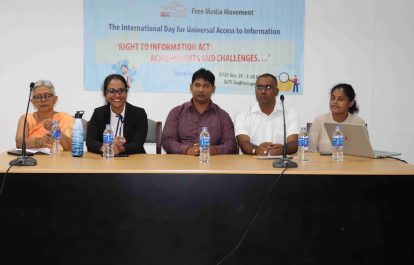Resources
Sri Lanka : The commission has released information for 87% of the appeals received – Attorney-at-Law Ashwini Natesan Weerabahu
30 Sep, 2020
Attorney-at-Law Ashwini Natesan Weerabahu presenting an analysis of the results of a study conducted regarding the difficulties and problems faced by various applicants in obtaining information under the Right to Information Act stated that the highest number of appeals to the Information Commission during 2017-2019 was on the subject of information on ‘institutional transparency’ and the number of such appeals was 571. She pointed out that the second-highest number of appeals amounting to 373 was about the subject on employment and labour, adding that all the appeals were based on the relevant authorities’ refusal to provide information to applicants in a timely manner and refusal to provide information. Ashwini Nateson Weerabahu, an Indian lawyer in technology, media and broadcast communications, made these revelations in a keynote address at an open forum discussion in Colombo held on Monday (28) entitled ‘Right to Information Act – Achievements and Challenges’. The discussion was organized by the Free Media Movement at the Sri Lanka Press Institute Auditorium at 96 Bernard Zoysa Mawatha, Narahenpita on the occasion of the International Day of Universal Access to Information.
Commenting further, she said: “Economic transparency has been considered in institutional transparency. It has focussed on the disclosure of important documents related to the decision-making process of public authorities, budget allocations and expenditure, criteria for admission to educational institutions, criteria in allocating benefits and privileges, on going status and development of infrastructure projects, salary details and criminal icnidnets etc. Consideration has been given to the abuse of power conferred by ‘corruption’. For example, there has been a focus on misuse of funds, irregular allocation of resources and mismanagement. Analyzing the perspective of supply in accordance with the demand in this research has been primarily based on a research conducted in Rajasthan, India.
The case regarding the disclosure of large discrepancies in the payments made to the consulting firms during the construction of the Akuregoda Defense Headquarters is a key matter considering the major decisions of the Commission. This was widely reported in the media.
The exception for National Security has not been withheld and the revelations were so powerful that an order had to be issued to the relevant consultancy firm by the Ministry of Defense to repay the excess money.
Similarly, the Pilots’ Association also requested information on several agreements signed by the Chief Executive Officer, Head of Human Resources and Chief Commercial Officer of SriLankan Airlines, the national carrier. Relevant information was issued on the instructions of the Commission. Accordingly, the Commission ordered the release of wages paid and other agreements. In this instance as well, consideration of an exception based on privacy and erosion of trust with other states has been refused.
The Commission has received 783 appeals against public authorities of the Central Government. While 259 have been submitted at the provincial level and 142 have been submitted at the Divisional Secretariat level. Among these, the response rate within 14 days ranged from 31% -34%. The response rate for 28 days ranged from 18% -27%.
The number of appeals that the Commission has released information was 87% while 16% of appeals have been rejected.”
Inaugurating the meeting, Seetha Ranjanee, Convener of the Free Media Movement, spoke on the struggle leading up to the enactment of an Act to guarantee the right to information. She highlighted the historical journey of the contribution made by the Free Media Movement since its inception for this cause. Three young journalists Rahul Samantha Hettiarachchi, S. Sivakumaran and Indunil Usgodaarachchi also addressed the panel and described the experiences they faced while using the Right to Information Act on behalf of the people.
Rahul Samantha, a journalist who has completed 18 years of service in the field of electronic and print media, said that currently there is a tendency in the country to treat journalists who apply for information under the Right Information Act, as criminals and subject them to police investigations. He said that he had recently requested information from the office of the Senior Superintendent of Police in charge of the Vavuniya area, and in response, the Vavuniya Police Criminal Investigation Division has launched a special investigation about him. He stated that in the past two years, he had made applications from nearly 1,150 public authorities seeking information, but only 174 of them had acknowledged that the application had been received. He added that he had lodged about 150 appeals with the Information Commission against the non-disclosure of information and some of these appeals are being investigated.
Sivakumaran Assistant Editor of Virakesari, sharing his experience said that he had submitted a right to information application to the Telecommunications Regulatory Commission (TRC) in 2010 to find out about who was paying the cost to the telephone companies for telephone text messages sent by the President on New Year’s Day. He also said that he had inquired from the Telecommunications Regulatory Commission as to who had given his personal information to the President without his permission. Sivakumaran revealed that instead of providing the relevant information, the immediate response was that an official of the Presidential Secretariat had telephoned his editor and inquired details about him.
He said that the Hatton Municipal Council had decided not to allow cremations in the future after he inquired about the approval process for public cremations held from time to time at a public stadium in the Hatton area, which is also used for sports and cultural activities by a large number of schools in the vicinity.
Speaking to the media, Indunil Usgodaarachchi, a journalist from the Ravaya newspaper, said that when inquired from the Railway Department regarding the number of elephant deaths which were increasing day by day, due to train collisions, she was able to find out that 40 locomotives currently in operation do not have speedometers. An investigation carried out regarding a statement made by a Member of Parliament regarding the presence of high-risk chemicals in imported milk powder revealed that the research conducted from the samples of suspicious milk powder sent to Germany had revealed that the milk samples did not contain any such hazardous chemicals. However, she pointed out that the media did not report this news.
Participating in the open discussion, several journalists commented on their experiences with the use of the Right to Information Act as well as the opportunities available to the public.
Written By
 Free Media Movement
Free Media Movement
Free Media Movement c/o SLPI, No 96, Kirula Road Colombo 05, Sri Lanka Telephone: +94 777 394 959 Fax: +94 11 257 3279
Comments
Resources
- IFJ South Asia Media Bulletin, February 2023 02/15/2023 Download
- IFJ South Asia Media Bulletin, January 2023 01/18/2023 Download
- Nepal Press Freedom report 2022 01/03/2023 Download

